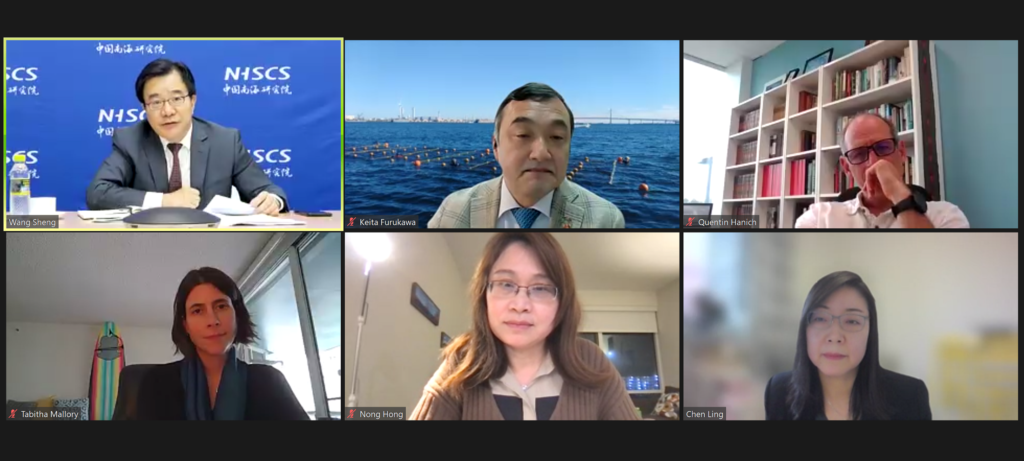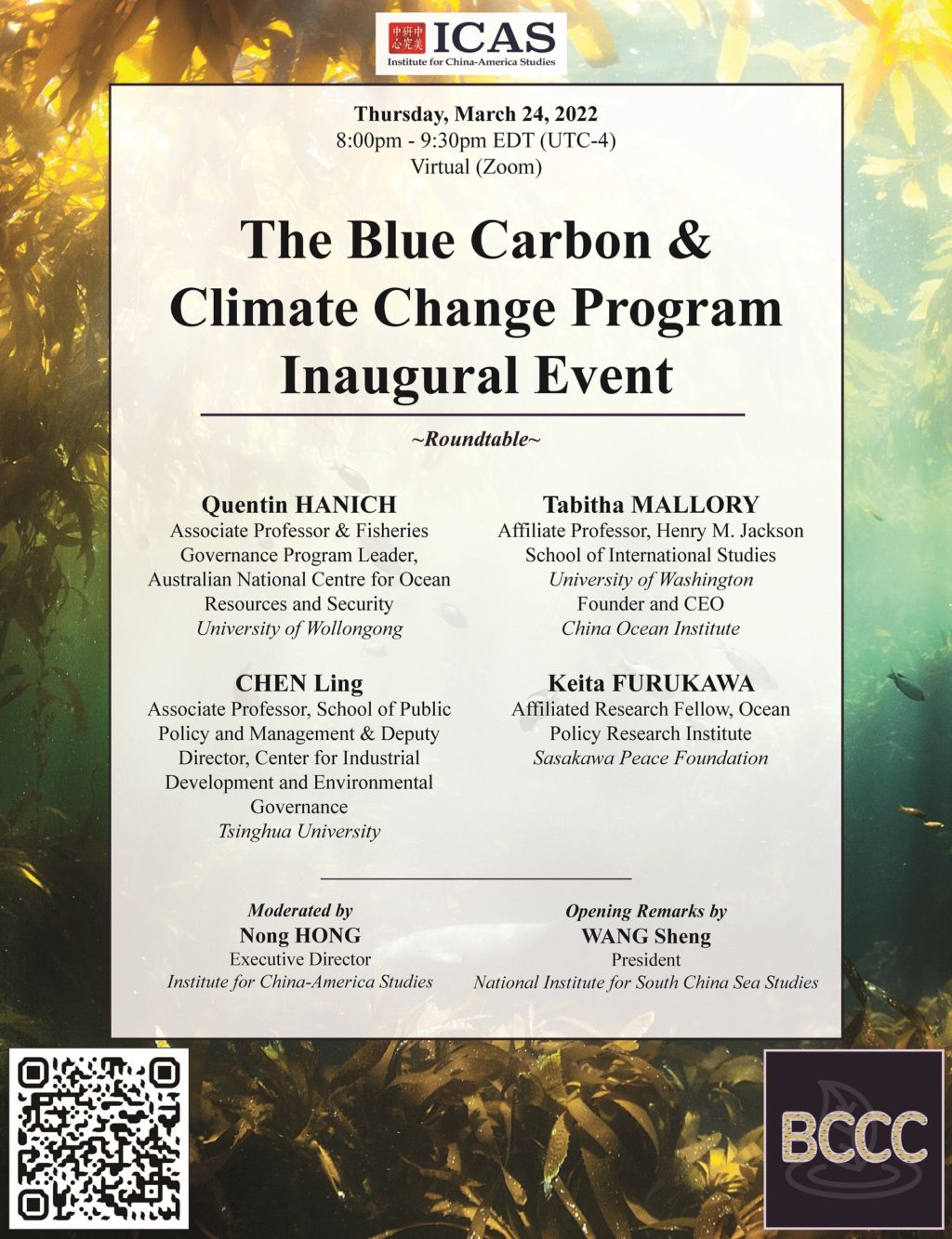
EVENT SUMMARY
On March 24, 2022, the Institute for China-America Studies (ICAS) officially launched its Blue Carbon & Climate Change (BCCC) Program. The inaugural event of the BCCC program brought together expert scholars from the United States, China, Japan, and Australia to discuss each country’s practices and perspectives on blue carbon and its potential role in building global relations.
Professor Wang Sheng, President of the National Institute for South China Sea Studies and Senior Advisor of ICAS’ BCCC Program, delivered opening remarks, calling for China and ASEAN countries to further collaborate on developing the blue carbon economy as well as jointly contributing to the building and standardization of the global carbon market. The presentations and discussion that followed was moderated by Dr. Hong Nong, Executive Director and Senior Fellow at ICAS, and featured four speakers: Dr. Quentin Hanich, Associate Professor & Fisheries Governance Program Leader, Australian National Centre for Ocean Resources and Security, University of Wollongong; Dr. Keita Furukawa, Affiliated Research Fellow, Ocean Policy Research Institute, Sasakawa Peace Foundation; Dr. Tabitha Mallory, Affiliate Professor, Henry M. Jackson School of International Studies, University of Washington, and Founder and CEO, China Ocean Institute; and Dr. Chen Ling, Associate Professor, School of Public Policy and Management and Deputy Director, Center for Industrial Development and Environmental Governance, Tsinghua University.
The four panelists first introduced a specific aspect of the development of the blue carbon economy within their respective countries and the implications for economic development, international regulatory institutions, academic and technical cooperation, and social and local activities.
Dr. Hanich discussed the impact of climate change on international fisheries, particularly on the fishing economies of the developing Pacific small island states. He highlighted the importance of joint international efforts in managing transboundary fisheries and jointly combating climate change that could lay solid foundations for developing international blue carbon cooperation. Dr. Hanich also cautioned that international cooperation over climate issues should also ensure that developing countries receive economic benefits in order to avoid “climate injustice.”
Dr. Furukawa introduced Japan’s experience and recent activities in promoting the blue carbon economy, including the involvement of local governments and volunteer groups to actively create a blue carbon ecosystem in Japan’s seas. He also introduced Japan’s experience in developing a successful mechanism to monitor the productivity of blue carbon, which is essential to the further development of a successful blue carbon trade system. Dr. Furukawa suggested that, once a domestic carbon trade system is appropriately established, Japan’s next step is to expand collaboration with global actors and establish links between the global agenda and local action from the perspective of science and governance.
Dr. Mallory began her presentation by describing her personal experience with the mangroves of the Everglades in Florida. Mangroves are essential blue carbon plants, but their numbers are dramatically declining due to rising sea levels exposing them to higher salt water concentrations and the building of additional canals in cities. She cautioned that practical efforts are needed to preserve these carbon-sinking plants in order to maintain a blue carbon-friendly ecosystem. Dr. Mallory also discussed the current state of development of the blue carbon economy in the United States. She contended that the United States’ current blue carbon initiatives are not well organized or connected. While federal agencies such as the U.S. Geological Survey and the National Oceanic and Atmospheric Administration are involved in developing the blue carbon economy, conservation efforts are mostly implemented by local governments. Thus, the U.S. needs a comprehensive national blue carbon strategy to guide and synchronize blue carbon development, and more efforts are required to collect data for monitoring the process.
Lastly, Dr. Chen Ling introduced China’s current state of blue carbon development. She first reviewed the Chinese central government’s decision and its reasoning for pushing forward the blue carbon economy. Given its geography, Dr. Chen suggested that China has great potential to be a blue carbon sink and shared how Beijing has released a comprehensive strategy to develop a blue carbon economy. But she noted how the focus has thus far not been completed. So far, China’s efforts have predominantly focused on fisheries and agriculture but pay less attention to the preservation and growing of blue carbon plants such as mangroves. The lack of economic interest has limited attractions for local governments to work on establishing massive preservation areas, which are also inherently conflicting with local farmers’ interests to feed livestock and grow agricultural plants. Dr. Chen suggested that China should also explore the value-added investment potential of blue carbon resources, leverage more private sector investment into ecological restoration, and build a proper blue carbon market.
In the discussion session, which included questions taken from the audience, the panelists unanimously agreed that the development of the blue carbon economy is a vital effort to control carbon emissions and contain, or even reverse, the disastrous impacts of climate change. Moreover, the panelists also agreed that the scope of areas for future cooperation of the blue carbon economy is vast, and the potential for future international collaboration is more than promising.
SPEAKERS
Tabitha MALLORY
– Affiliate Professor, Henry M. Jackson School of International Studies, University of Washington
– Founder and CEO, China Ocean Institute
Keita FURUKAWA
– Affiliated Research Fellow, Ocean Policy Research Institute, Sasakawa Peace Foundation
Quentin HANICH
– Associate Professor & Fisheries Governance Program Leader, Australian National Centre for Ocean Resources and Security, University of Wollongong
CHEN Ling
– Associate Professor, School of Public Policy and Management & Deputy Director, Center for Industrial Development and Environmental Governance, Tsinghua University
OPENING REMARKS BY
WANG Sheng
President, National Institute for South China Sea Studies
MODERATED BY
Nong HONG
Executive Director, Institute for China-America Studies
Time Zone Clarifications:
Thursday, March 24, 2022
8:00pm – 9:30pm EDT (UTC-4) (Washington, DC)
5:00pm – 6:30pm PDT (UTC-7) (Seattle, WA)
Friday, March 25, 2022
8:00am – 9:30am CST (UTC+8) (Beijing, China)
11:00am – 12:30pm AEDT (UTC+11) (Wollongong, Australia)
9:00am – 10:30am JST (UTC+9) (Tokyo, Japan)
Cover Image: Getty Images Royalty-Free



